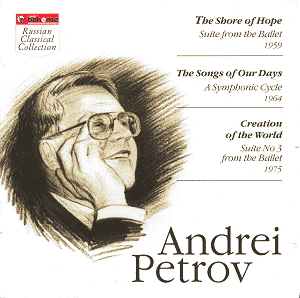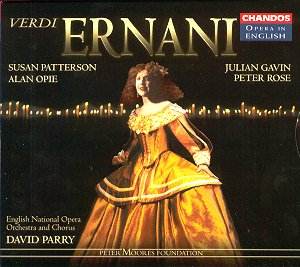 Composer: Andrei Petrov
Composer: Andrei Petrov
Works: Suite from the Ballet The Shore of Hope (1959), Symphonic Cycle The Songs of Our Days (1964), Suite no. 3 from the Ballet Creation of the World (1975)
Performers: St Petersburg Philharmonic Symphony Orchestra/Eduard Serov, Leningrad Orchestra of Early and Modern Music/Eduard Serov, St Petersburg Philharmonic Symphony Orchestra/Arvid Jansons
Recording: St Petersburg Recording Studio, date unspecified
Label: Boheme Music CDBMR 012198
Andrei Petrov, a significant figure in the post-war Soviet musical landscape, emerges with a vivid and eclectic voice in this collection of orchestral works, showcasing a spectrum of influences that span genres and styles. The Suite from the Ballet The Shore of Hope, composed in 1959, serves as an intriguing entry point into Petrov’s compositional universe, reflecting the historical context of a composer negotiating the strictures of Soviet aesthetics while simultaneously drawing from a rich tapestry of Western influences. This album, recorded by esteemed orchestras in St Petersburg, offers a compelling glimpse into Petrov’s artistic evolution and the broader cultural currents of his time.
The performance of the Suite from The Shore of Hope opens with “The Sea,” a movement that strikingly invokes the impressionistic hues of Debussy’s La Mer before transitioning into a radiant depiction of dawn reminiscent of Ravel’s Daphnis et Chloé. This duality is expertly navigated by the St Petersburg Philharmonic Symphony Orchestra under Eduard Serov, whose baton strikes a delicate balance between lush orchestration and rhythmic vitality. The articulation of the strings, particularly in the upper registers, conveys an airy lightness, while the brass punctuates the texture with a boldness that recalls the grandiosity of Shostakovich. The interpretation here is noteworthy for its clarity and emotional depth, deftly avoiding the pitfalls of sentimentality that sometimes plague lesser works in this vein.
In The Songs of Our Days, the Nocturne provides a striking contrast with its bluesy saxophone solo, supported by an orchestration that evokes the spirit of the James Last-style pop orchestras. The soloist’s phrasing is imbued with a languid expressiveness that enhances the work’s nostalgia, while the accompanying strings and woodwinds create a rich tapestry of sound that resonates with both warmth and sophistication. Such moments reveal Petrov’s ability to blend styles seamlessly, a trait that is both derivative and yet refreshingly original. The engineering quality of this recording merits particular commendation, as the sound is crisp and well-balanced, allowing for a full appreciation of the orchestral colors and dynamics.
The Suite no. 3 from the Ballet Creation of the World, recorded by the Leningrad Orchestra of Early and Modern Music, concludes the album with a flourish. The finale, while undeniably kitsch, is executed with such exuberance that it captivates rather than alienates. Here, Petrov’s homage to Bernstein is palpable in the rhythmic drive and melodic exuberance, creating a celebratory atmosphere that invites the listener into a dance of sorts. The orchestra, under Serov’s direction, embraces this exuberance, transforming what might seem like superficial entertainment into a genuinely engaging musical experience.
Petrov’s oeuvre, though at times derivative, showcases an astonishing fluency and a remarkable ability to synthesize diverse influences into a cohesive artistic language. The performances captured in this recording are not merely competent; they reflect a deep understanding of the material, with each conductor and ensemble contributing to a vibrant interpretation that honors Petrov’s intent while also inviting new interpretations. For those who appreciate accessible yet richly textured orchestral music, this recording is a delightful discovery, promising both excitement and depth in equal measure.



